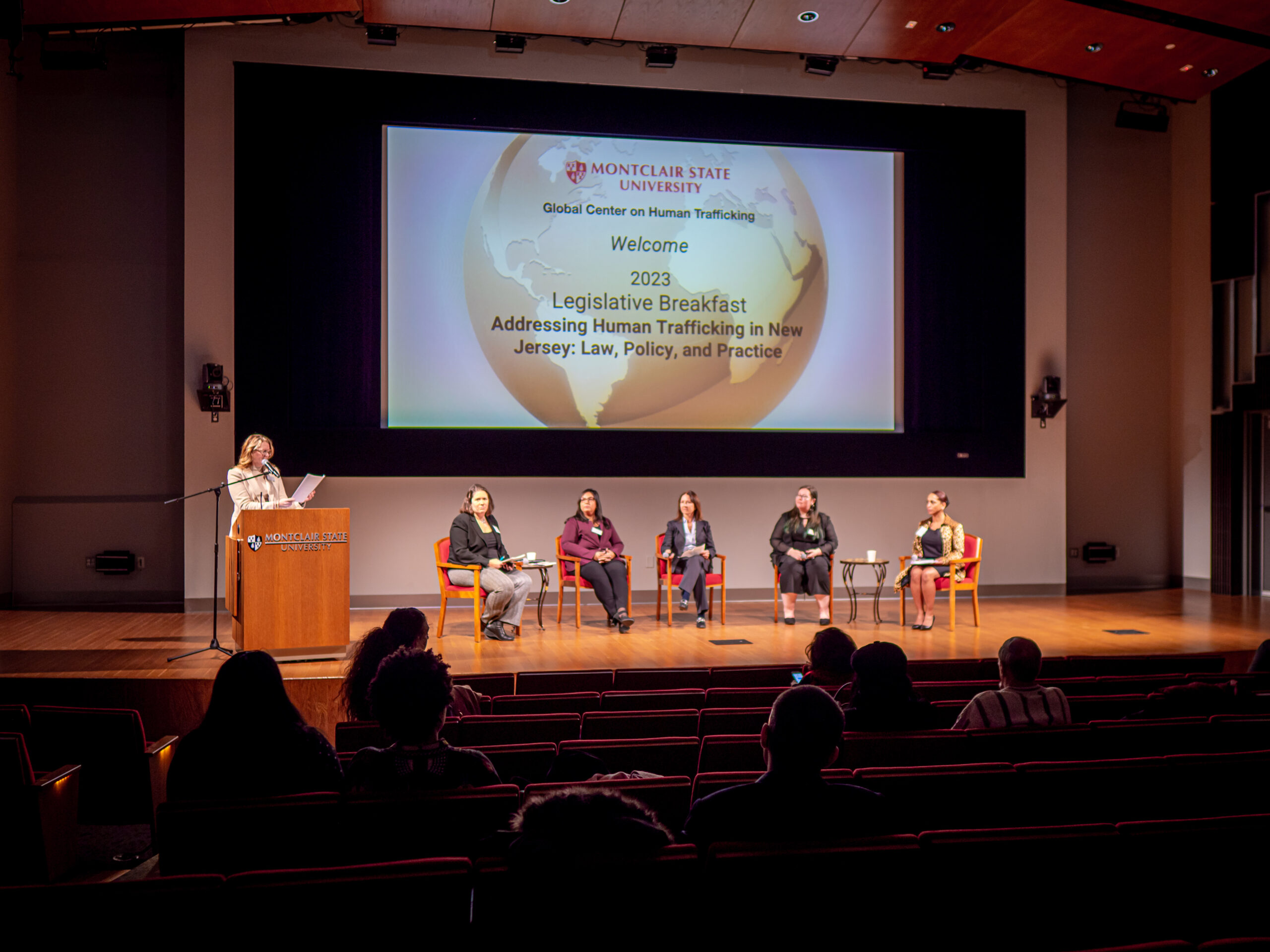Human trafficking remains a profound problem in the 21st century that is not always accurately portrayed in the media. According to National Human Trafficking Hotline, one of the most prevalent inaccuracies about human trafficking is that it always or frequently involves kidnapping or some other forms of physical coercion. This is not the case in reality, as the majority of human traffickers employ psychological tactics like manipulation, deception, coercion, and threats to ensure victims do exploitative work and commercial sex. According to Polaris Project Statistics, thousands of people are trafficked in the United States on a yearly basis. A significant portion of traffic victims in the United States year by year are women and children, who are often considered as the most vulnerable population.
A study at the University of Missouri–St. Louis found that one of the most prevalent techniques used by traffickers to ensure total control of their victims is making them dependent on substances. The addiction to the drugs traffickers provide creates a strong grip on the victims, making escape extremely difficult. This technique of control ensures compliance and obedience, leveraging the destructive power of addiction to enslave the victim. As a result, the victim is no longer just physically dependent on the trafficker; they are now chemically dependent as well. The National Survivor Study conducted by one of the nation’s leading anti-trafficking organizations, Polaris Project, found that many survivors of human trafficking have a history of substance abuse, often exacerbated by their traffickers. This manipulation worsens the victim’s fate, entangling them further in a web of exploitation from which it may seem impossible to escape.
Another form of human trafficking is familial trafficking, which exploits the trust that exists within the family unit. A report by the International Organization for Migration stated that 41% of child trafficking cases are conducted by relatives or caregivers. This type of human trafficking significantly impacts the victims psychologically as their trust is betrayed. According to a study by the Hong Kong Dignity Institute, victims trafficked through the familial channel experience emotional manipulation, fear, and trauma attachment, making their escape difficult. The betrayal of their trust in a setting that should be a safe haven leaves lasting effects on them, which include anxiety, depression, and post-traumatic stress disorder.
The United Nations Office on Drugs and Crime 2022 Global Report on Trafficking in Persons stated that 42% of people trafficked globally are women and 18% are young girls making women the most targeted population. The combined adverse effects of drug addiction and trafficking create a compounded trauma for victims, making it difficult for them to get out. Many survivors of trafficking report that their initial recruitment involved promises of a better life, only to be ensnared in a world of addiction and exploitation. According to the 2022 study at the University of Missouri–St. Louis, 20% of people engaged in trafficking have substance abuse issues, often initiated and maintained by their trafficker to control them. Public awareness campaigns, like the Blue Campaign and Stop This Traffic Manasseh Project and Kent County Human Trafficking Task Force, point out that human trafficking is not a remote problem but may occur in any community. As such, it is essential to be aware and educated on how to notice signs of trafficking and how to provide continued support to survivors. According to Nevada Attorney General Aaron Ford, these signs include physical abuse, avoidance of eye contact, appearing fearful and anxious, inability to speak freely, lack of identification documents, restricted movements, appearing malnourished, etc. Law enforcement, social services, and community organizations need relentless efforts to effectively curb this rampant problem and help those caught within it.
Trauma-Informed Care in Emergency Response
According to a 2018 study at Florida State University, most emergency medical services (EMS) and first responders are not trained in recognizing the trauma of human trafficking victims and providing effective support for them. They need specialized training on trauma-informed and victim-centric approaches that address all the issues associated with human trafficking. This specialized training equips them with the necessary skills to identify survivors’ experiences and comprehend the adverse effects their experiences have had on them. This, in turn, aids EMS and first responders in providing adequate support and treatment that places priority on survivors’ well-being, safety, and empowerment. According to the Substance Abuse and Mental Health Services Administration’s Practical Guide for Implementing a Trauma-Informed Approach, trauma-informed care involves creating a safe environment, building trust, and empowering survivors. This method is crucial in providing effective assistance and reducing the risk of re-trafficking and further harm.
Trauma-informed care is not a one-size-fits-all solution but rather a framework that emphasizes understanding, recognizing, and responding to all types of trauma. According to the Practical Guide for Implementing a Trauma-Informed Approach, the key principles include safety, trustworthiness, peer support, collaboration, empowerment, and cultural, historical, and gender considerations. By applying these principles, emergency responders can better assist victims of trafficking, address their unique needs, and promote recovery and reintegration into society.
Emergency Managers’ Role in Identifying Victims of Human Trafficking
According to a 2006 study funded by the Department of Health and Human Services, emergency managers play a crucial role in recognizing and responding to the trauma of human trafficking victims by:
- Coordinating with law enforcement and social services to identify potential victims;
- Providing training on human trafficking awareness and response;
- Developing protocols for victim support and referral;
- Facilitating access to medical, mental health, and social services;
- Ensuring victim-centered and trauma-informed care;
- Collaborating with organizations specializing in human trafficking support;
- Conducting needs assessments and resource mobilization;
- Supporting victim advocacy and empowerment;
- Facilitating information sharing and data collection; and
- Continuously improving response efforts through lessons learned and best practices.
Recognizing the trauma of human trafficking victims is essential to provide appropriate support and services. Emergency managers can help ensure a comprehensive and compassionate response. This, in turn, aids emergency managers and first responders in providing adequate support.
Comprehensive Support for Human Trafficking Survivors
Human trafficking survivors have needs ranging from short-term necessities like food, shelter, and medical care to long-term ones that include mental health services, vocational training, and education. In addition, they need legal assistance to adequately navigate legal struggles, get justice for the injustice done to them, and safeguard their rights. However, many survivors of human trafficking find it difficult to access these services due to the crimes they may have engaged in or perpetrated while in the net of human traffickers. In order to ensure survivors of human trafficking do not face additional struggles, the Trafficking Survivors Relief Act was proposed in 2022. This bill will ensure that survivors of human trafficking are not punished for the crime they committed under duress, and it will grant them access to the assistance they need to properly rehabilitate and reenter society.
An effective system of support is essential for the successful rehabilitation of human trafficking survivors. Community organizations, non-governmental organizations (NGOs) such as the Polaris Project, La Strada International, or Anti-Slavery International, and support groups for other survivors constitute this network. These communities offer encouragement, a feeling of community, and vital assistance systems. Furthermore, NGOs and government initiatives that provide safe and long-term housing options provide survivors with a solid base on which to rebuild their lives with dignity and optimism. Furthermore, comprehensive support addresses mental health concerns through trauma-informed therapeutic approaches. Programs such as cognitive behavioral therapy, Eye Movement Desensitization and Reprocessing, and group therapy can be effective in helping survivors manage trauma and build resilience.
The development of intervention strategies in addressing human trafficking and supporting victims requires a multidisciplinary approach and teams. Multi-disciplinary teams should include law enforcement, prosecutors, medical staff, mental health staff, forensic interviewers, victim services specialists, advocates, housing personnel, treatment facilities and personnel, NGOs, and travel and transportation personnel, all with an understanding of the victim-centered approach. Since it is an issue of transnational interest that requires cooperation at all levels, and many sectors must combine their unique perspectives and resources. Law enforcement agencies play a crucial role in the identification and prosecution of traffickers, in dismantling networks of trafficking, and in protecting potential victims. They bring traffickers to justice while ensuring that victims are treated respectfully and humanely. Social services support the survivors: safe housing, psychological counseling, treatment, and medical and legal support. These services are needed for survivors to heal from and rebuild their lives after traumatic experiences. They enable a better understanding of trafficking dynamics and the development of new strategies to counter them. They publicize the situation of victims and lobby for better laws and policies on trafficking, ensuring that the voices of these victims are considered in policy processes. They critically work in prevention and advocacy for systemic change to address the root problems of trafficking.

The Annual Legislative Breakfast is a yearly Montclair State University event at which lawmakers are called to address life-saving issues – human trafficking and housing insecurity – along with legislative solutions supporting survivors. The Global Center on Human Trafficking hosts the event, bringing together policymakers, survivors, advocates, educators, and community leaders for a vital conversation and building meaningful pathways.
The 2023 Annual Legislative Breakfast centered on the theme “Addressing Human Trafficking in New Jersey: Policy and Practice,” with assessments on the current effectiveness of policies against trafficking, potential gaps that had to be identified, and evaluations on the impact the gaps cause survivors. The ability to discuss updates from legislators, experts, and survivors enhanced the key speakers’ emphases that practical support measures lay a robust support system for developing comprehensive policies to tackle the criminal aspects of trafficking.
Call to Action: How to Support Trafficking Survivors
Human trafficking and its profound connection with drug addiction provide a huge issue that necessitates a diversified strategy. Communities must meet the needs of these survivors by implementing trauma-informed treatment, campaigning for strong legislative support, and offering comprehensive assistance. The following are the detailed ways in which efforts can be invested to support human trafficking survivors:
- Engage communities to provide necessary support to survivors – Contribute time or resources to local organizations that support trafficking survivors. Active community participation can provide much-needed support and amplify these organizations’ efforts to assist survivors.
- Raise awareness about signs of human trafficking to reduce its prevalence – Social media platforms can educate networks about the signs of human trafficking and how to report suspicious activities.
- Support human trafficking survivors with financial contributions – Donate to public awareness campaigns and organizations that fight for trafficking survivors’ rights. Financial support is essential for sustaining these efforts and expanding their reach and impact.
- Educate the community about human trafficking – Correct common misconceptions about human trafficking and foster a deeper understanding of survivor experiences. Education can lead to a more informed public that is better equipped to support anti-trafficking initiatives.
- Combat exploitation – Stand against the demand that drives human trafficking by advocating for ethical practices and supporting legislation that targets exploiters. Creating a supportive environment for survivors involves addressing the root causes of exploitation and helping survivors escape it permanently.
Human trafficking is a major issue that requires the effort and attention of individuals and government agencies. It is as important to ensure survivors get adequate help as it is to create measures that cut down on its prevalence. People should be educated on the risk factors and elements that make them vulnerable to human trafficking. In addition to this, awareness should be created generally to ensure victims are recognized, thus making the crime more difficult to commit. Most importantly, adequate support should be provided to human trafficking survivors through collaborations of different disciplines and effective strategies that ensure their rehabilitation and reintegration. Together, through sincere actions like those outlined in the call to action section, individuals and agencies can make a difference by helping survivors reclaim their lives and stopping human trafficking and drug abuse.
The author wishes to thank the NJ Coalition Against Human Trafficking for its contributions to the research provided in this article.

Sandra Dennis-Essig
Sandra Dennis-Essig is a dedicated professional with a strong background in emergency management. She is a graduate of the Federal Emergency Management Agency (FEMA) National Emergency Management Basic Academy, the Emergency Management Project (Class #25), and holds certificates from the FEMA/Department of Homeland Security, Cybersecurity and Infrastructure Security Agency (CISA), National Nuclear Security Administration/Nuclear Forensics Operations, Counterterrorism Operations Support, the Texas A&M Engineering Extension Services Infrastructure Disaster Management Certificate Program, and the National Disaster Preparedness Training Center. Sandra serves as a Decontamination Team Member with a Patient Decontamination Team in San Diego, California, and as a Disaster Duty Officer for the American Red Cross in San Diego and Imperial County. She collaborated with the New Jersey Coalition Against Human Trafficking as an advocate, speaker, and survivor. Sandra currently serves as a Selective Service Board Member for the State of California and has previously served as a volunteer Selective Services Board Member for the State of New Jersey.
- Sandra Dennis-Essighttps://www.domesticpreparedness.com/author/sandra-dennis-essig
- Sandra Dennis-Essighttps://www.domesticpreparedness.com/author/sandra-dennis-essig
- Sandra Dennis-Essighttps://www.domesticpreparedness.com/author/sandra-dennis-essig






